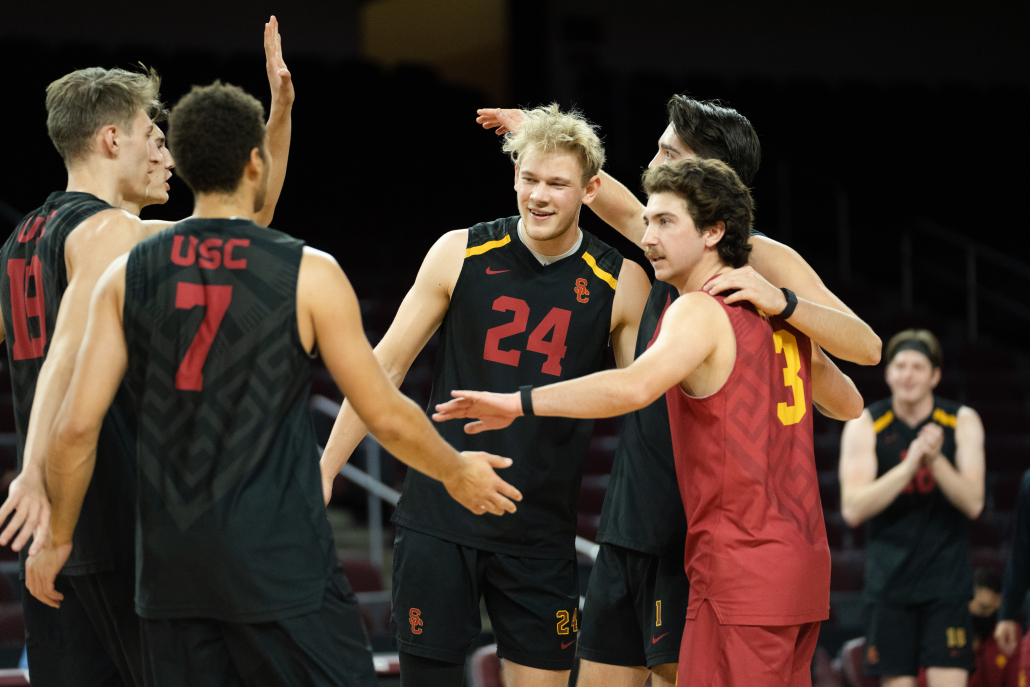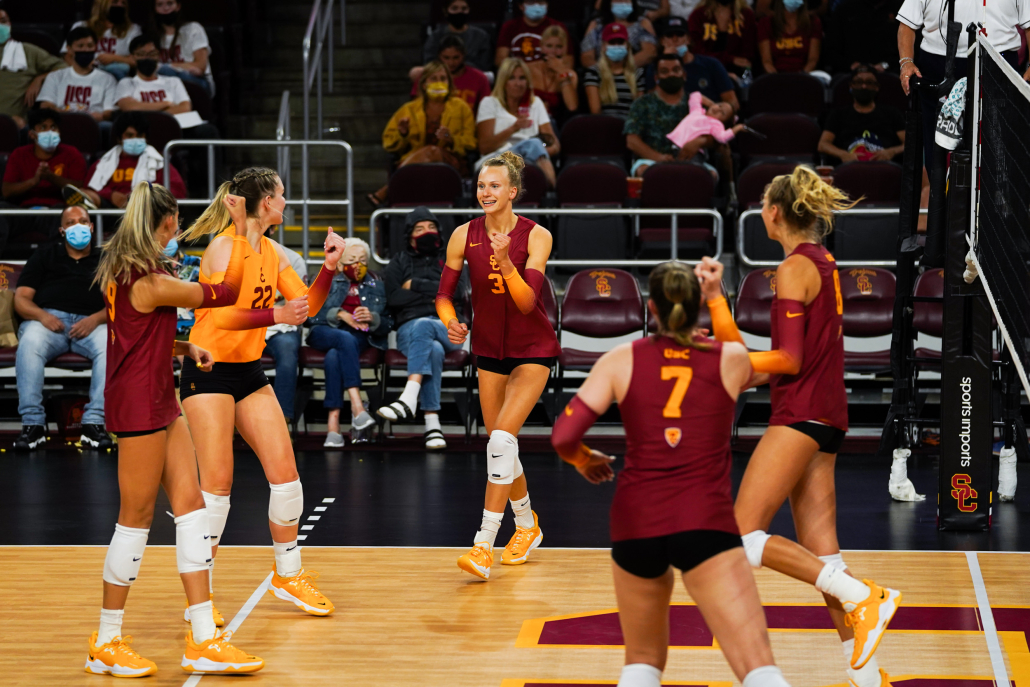German stars anchoring USC volleyball

Two tall figures walk the streets of the University Park campus. If you listen in, you can hear them speaking to each other — in German. They’re talking about their packed schedules, practices and school assignments.
You get a glance at the tags on their backpacks: “Simon Gallas” and “Emilia Weske.” They’re USC volleyball players.
Gallas and Weske made the same leap of faith: leaving their home country of Germany, completely oblivious to what life would be like in the United States, for the opportunity to compete in the sport they love and earn a college degree. Now, they’re reaping the benefits.
“It was pretty much like a blind shot, but I don’t think it was a bad blind shot,” Gallas said. “It was a full-on hit.”
Neither Gallas nor Weske had ever been to USC before they enrolled. Moreover, neither had stepped foot in America. There were no fancy recruiting trips with photo ops and opportunities to meet coaches in person; instead, just flights to Los Angeles International Airport and a drive to campus.
“Just arriving at this new place, not knowing anybody, it was definitely an adventurous period of time,” Weske said.
Volleyball has long been on the back burner in terms of national attention in Germany, oftentimes overshadowed by sports such as soccer.
Even Gallas, whose parents met playing volleyball, said he started off playing soccer and basketball before switching to his current sport, while Weske started out as a gymnast.
One common thread that brought them to the sport? Their heights.
“I was always quite the tallest in my classes,” Gallas, who stands today at 6 feet 8 inches, said.
“It [turned] out I was growing so tall,” Weske, now 6 feet 2 inches, said. “People were like, ‘Hey, you look like you could be really good at volleyball.’”
The recruiting process was a blur for Gallas and Weske. Neither took official recruiting visits, instead talking with coaches and coordinating their applications through them.
Gallas was sold on playing at USC after having in-depth conversations about team strategy with coaches where he said he felt “very welcomed and sought after.” Head Coach Jeff Nygaard would wake up at 5 a.m. on the West Coast to call Gallas.
“[Nygaard] wanted to see what I think about the game,” Gallas said. “I would’ve never expected him to talk to me at that time … That’s something that I really enjoyed … Nobody has ever talked to me about volleyball like that.”
For Weske, USC’s women’s volleyball associate head coach JJ Van Niel helped guide her through the application process after she committed.
Van Niel tried to make her recruitment normal despite the circumstances.
“I even did a tour of campus with my phone,” Van Niel said. “It’s the one and only time in my college coaching career that I’ve recruited someone without ever having them visit the campus.”
Weske said things were up in the air up until the last moment.
“It was a really uncertain process. I didn’t know really if it was gonna work out,” Weske said. “When I finally got my visa and booked the flight, that’s when it hit me. My family [was] like, ‘Oh shit, it’s happening.’”
The two first met in person during orientation week in Fall 2019. Gallas’ family flew out to L.A. with him, but Weske’s didn’t. She tagged along and, for the week, assumed the role of “the extra daughter.”
“It really makes all the difference when you have a person you can talk to in your native language,” Weske said of Gallas.
Navigating through college life is hard enough as it is. Now, add the complexity of solidifying another language and immersing yourself in another culture. Then, add not knowing anyone and having to start anew with friendships.
They didn’t pick the easiest subjects to study, either — Gallas is majoring in biological sciences, Weske in environmental science and health.
Slowly, though, the two began to assimilate.
“[My teammates have] definitely welcomed me well,” Gallas said. “The idea that we are equal, all players of the same team with the same goal, that idea forges us into one.”
For Weske, though, it wasn’t as seamless. She remembered she “was so uncomfortable” and “did not know how to act” at her first team photoshoot. Yet, it was a team retreat to Malibu over a meal of s’mores (a first for her) where Weske had her epiphany.
“From pretty early on, people were very supportive and there for me,” Weske said. “For me personally, something clicked, and I was like, ‘Wow, I feel like I’m in the right place right now.’”

L.A. posed some stark contrasts to Bühl and Potsdam, Gallas’ and Weske’s respective hometowns. The two quickly picked up on some differences in the styles of living in the U.S.
“In Germany, it’s like everyone is in their bubble,” Gallas said. “They stay in their groups, but [in L.A.], it’s way more open. There’s nobody that wouldn’t talk to you if you talk to them.”
Over the course of their time in L.A., Weske and Gallas have blended into American culture.
“When people see us talk German, they’re like, ‘Oh, I actually forgot that you guys are not from here,’” Weske said. “People always forget because [we’re] in that environment where you’re that Americanized person all the time.”
However, the two still make it their goal to preserve their German heritage. Weske maintains her love for German rap and Gallas cooks spätzle, an egg noodle and the dish he called “the German food,” every so often.
“I don’t think that you ever grow out of it,” he said. “You just add to your German culture.”
Gallas and Weske are established now. They’re two of the biggest contributors to their respective teams, making history for USC volleyball.
Weske, the first German to ever play for USC women’s volleyball, is proud to be a trailblazer.
“I feel honored,” she said. “I think it’s a great opportunity to make history and to bring a piece of my culture into this place but also continue this legacy fueled by my culture.”
Her individual production speaks for itself. Weske posted 367.5 points and 303 kills in 2021, both the second-most for the Trojans.
“We view her as an integral piece of our team, both on the court and off the court,” Van Niel said.
But Weske isn’t satisfied with just her own accolades, especially given that the team finished the season 15-15.
“It doesn’t sit right with me,” she said. “I think there’s a lot of work to do … There’s some frustration about last year. I’m really stoked to be playing another season here and make up for that.”
Gallas came at the right time for the men’s volleyball program. For a team that had just one winning season since 2016, his play this year helped propel the Trojans to a 22-7 record. This season, Gallas led the team with 453 kills.
“I’m just one of the 22 guys on the team,” he said. “I couldn’t be kill leader without [my teammates] … It’s their achievement as much as mine.”
Gallas and Weske took chances to get to where they are now. Nothing was guaranteed, and for both, there’s no question as to whether their choices paid off.
“Of course it’s worth it,” Gallas said. “I think it’s needless to say … You definitely earn what you sow in the end.”
Their journeys across the world to play volleyball exemplify the uniting power of sport.
“Sports [are] a great way to connect people across all different cultures, backgrounds and interests,” Weske said. “If you share that one common passion around a sport, that can only create bonds that last.”

